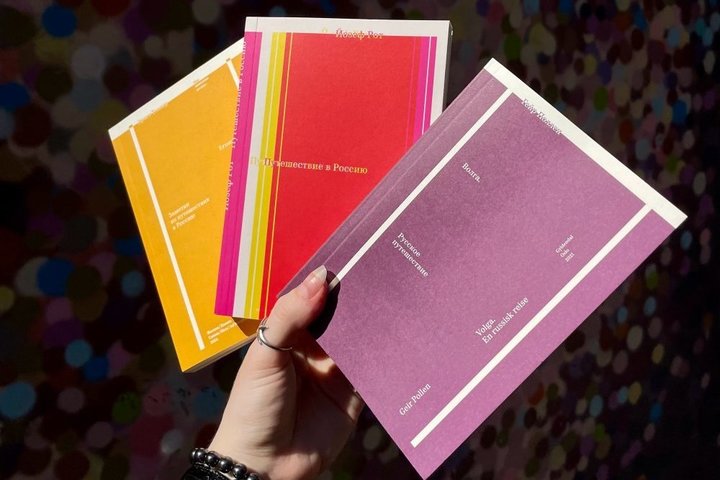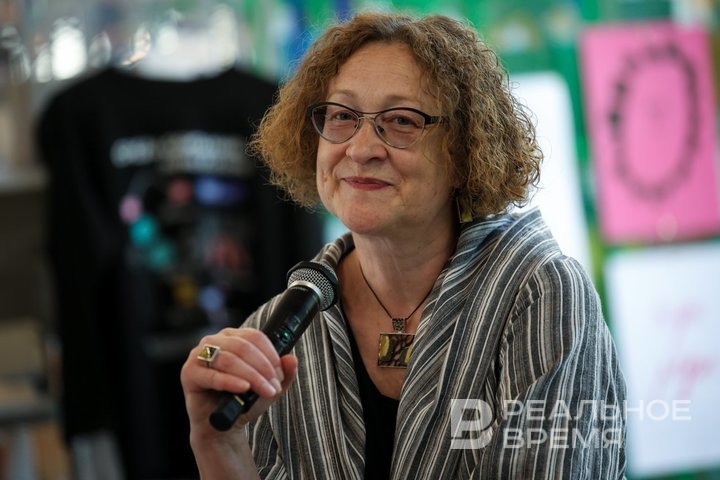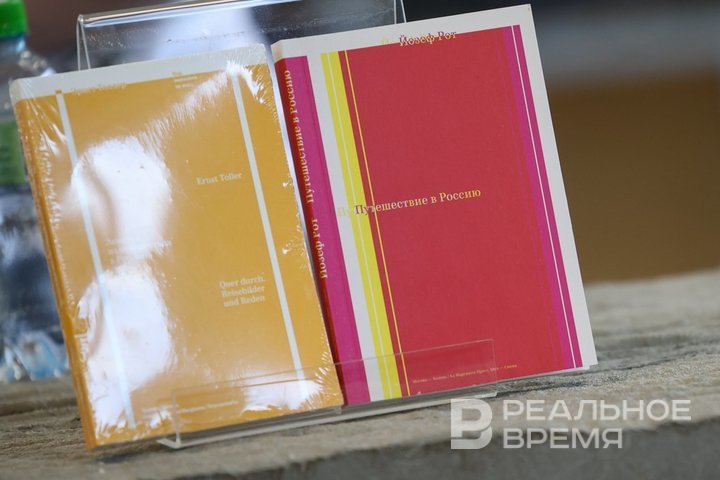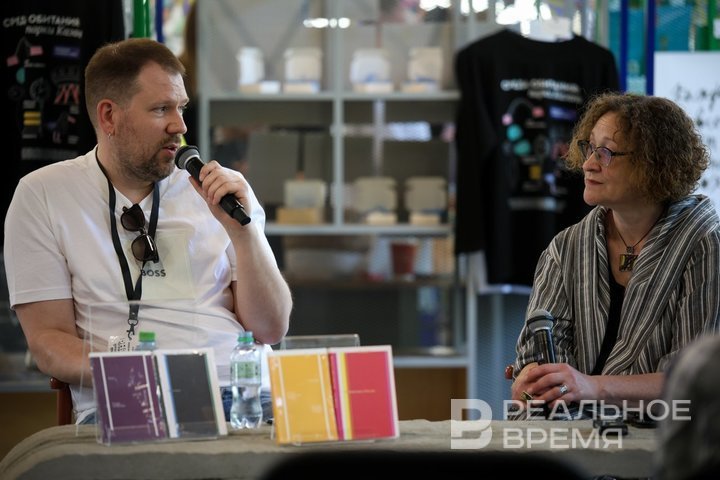‘I was stunned, hungry, I was looking ahead’
At Smena Summer Book Festival, they spoke about why foreigners travelled across Russia

In 2023, Smena publishing house, together with Ad Marginem, libra, and the Peredelkino House of Creativity, began organising translation residencies. During these residencies, participants worked on books by authors who had visited our country as far back as a hundred years ago and left behind extensive — and sometimes brief — memoirs, notes, and reports. The series includes the collection Down the Volga, as well as individual books by Joseph Roth and Ernst Toller. At Smena Summer Book Festival, another book was presented — this time by a contemporary author, the Norwegian Geir Pollen — as well as a discussion of the editions already released.
Geir Pollen’s Russian Journey
“I caught myself thinking that it’s quite difficult to distinguish between the books already published in this series and those still in preparation. That’s because each title contains the words ‘Russian’ and ‘journey’. And yet they are all called something slightly different: A Russian Journey, Journey to Russia, Journey through Russia. It seems we’ll soon have to start inventing new titles,” began Alexander Filippov-Chekhov, curator of the translation workshops at the Peredelkino House of Creativity, founder of the publishing house libra, and translator. But the book by the Norwegian Geir Pollen includes one more word in its title — Volga.
In 2024, Kirill Maevsky, co-founder of Smena Centre for Contemporary Culture, approached philologist and Scandinavian studies expert, specialist in Norwegian literature and translator Elena Rachinskaya with a proposal to translate and later publish Pollen’s book. She happened to know the author personally. The fact is that Geir Pollen is not only a writer and the chairman of the Norwegian Writers’ Union, but also speaks Russian fluently and works as a translator. In addition, he taught Norwegian at Saint Petersburg State University and later to students in Moscow. Altogether, Pollen lived in Russia from 2007 to 2020.

“He is a man who reads a lot and is curious about everything around him. Geir became interested in the Volga and began making various trips along the river. And so, little by little, his book came together,” said Elena Rachinskaya, speaking about the background of Volga. A Russian Journey. The Norwegian edition of Pollen’s book is a rather substantial volume — over 500 pages. The Russian version is just over one hundred, nearly 30 of which are photographs.
“The content of the Russian version of the book was selected by the mentors of the translation seminar led by Lyubov Gorlina. These are seven or eight people with extensive translation experience and various awards and prizes,” said Rachinskaya. Beforehand, the translators asked Pollen’s permission, and he agreed to let them choose the chapters they liked. “There are fragments in the book that are interesting to us from the perspective of translation and linguistic play. And there are also charming, engaging chapters that we wanted to present to the Russian reader,” the translator added.
Rachinskaya also noted that translators are generally not very fond of working with books by foreigners describing Russia, as such works often contain “a lot of naivety.” “But Geir turned out to be a person of great sensitivity. And there is none of that in his book,” said Elena. What the book does contain, however, is a great deal of the unusual. For example, a Chuvash fairy tale that Pollen translated into Norwegian. There is also a story about Uglich, foreigners on the Volga, the phenomenon of the Russian dacha, the Smirnov trading house and the history of its famous vodka brand, and even a separate chapter on Karl Fuchs.
Ernst Toller’s Notes
The 1920s marked the peak of foreign travel to Russia. In addition to Joseph Roth and Ernst Toller, the country was visited by Austrian writer Stefan Zweig, German architect Bruno Taut, Japanese writer and journalist Tamiji Naito, American author Theodore Dreiser, German philosopher Walter Benjamin, British playwright Bernard Shaw, and many others. Some came to see the country, others to promote their ideas. Still others came to earn a living. The latter category includes Zweig — his first collected works were published in the USSR in Russian, and only later in his native German.

When the Soviet Union was beginning to take shape, the Bavarian Soviet Republic was established in Germany — it lasted less than a month. The playwright and expressionist poet Ernst Toller commanded the Red Army in that republic. It cannot be said that he was particularly successful in this role. When the Bavarian Soviet Republic collapsed, Toller was imprisoned. Meanwhile, in Moscow and Leningrad, well-known Soviet directors — including Vsevolod Meyerhold — were staging plays based on the works of the German playwright. “This brought Toller a rather controversial fame. That’s why he was invited to the USSR as a dramatist and poet of communist thought,” said Alexander Filippov-Chekhov.
Ernst Toller first came to Russia in 1926. The poet was received in the USSR as an important guest and taken to visit grand offices. However, during his stay, a denunciatory article about the German playwright appeared in the newspaper Pravda. As a result, he had to leave the Soviet Union hastily. He returned in 1934, during the Congress of Soviet Writers. “This time, Toller travelled across Russia and along the Volga, but he left no traces of his stay on the Volga,” added Filippov-Chekhov.
In the USSR, the writer was interested in the changes that had taken place in society after the Civil War: how science and education were developing, and what was happening to the roles of women and children. In his book TheNotes from a Journey to Russia, Ernst Toller left rather ambiguous impressions of his visit to the USSR. On the one hand, he noted technical progress, urban development, meetings with revolutionary figures and writers. On the other hand, he observed poverty and a low standard of living, tasteless urban construction, economic difficulties, and shortages of essential goods.
“Toller’s book is not a guidebook. There is little truth in it because he was trying to make a name for himself here. It is more of a document of the time,” said Alexander. He also noted that the playwright left “quite amusing” and “very naive” impressions of his visits to male and female colonies in the USSR. For example, Toller was convinced that all prisoners were fed exactly the same way as he was when he dined at the male colony.
Joseph Roth’s journey to Russia
Two years ago, the book Journey to Russia by Austrian journalist Joseph Roth was published in Russian. “Unlike the writers, Joseph Roth was inspired by something else. He was commissioned to write reports about the USSR. Without feeling any particular love for Russia, he came here to earn money,” said Alexander Filippov-Chekhov. Roth wrote for the newspaper Frankfurter Zeitung. The journalistic style demanded not only vivid stylistic choices but also “sensational facts.” “That is why Joseph Roth’s book is the most controversial in this series,” noted Filippov-Chekhov.
Roth’s book is a “journalistic investigation aimed at entertaining a German audience.” However, the material turned out to be engaging, as Roth’s journey was much longer than that of his colleagues. In addition to Moscow and Leningrad, he visited Nizhny Novgorod, Samara, Kazan, and Astrakhan. He travelled as far as Odessa, Kiev, and Minsk, and also went to Baku, Samarkand, and Tbilisi. Yet he wrote very little about his journey through the Caucasus.

I could write nothing. I was stunned, hungry, I looked ahead. It lasted two months. Had I been on another planet, the impressions would not have been so alien and strange.
This is a fragment of a letter from Joseph Roth to the editorial office of the newspaper for which he wrote his reports. In principle, it sums up the general impressions of foreigners from their travels across Russia. Some had more vivid experiences, others less so. Some adored it, like Toller; others disliked it, like Roth. But it is clear that it left none of them indifferent.
Ekaterina Petrova — a literary reviewer for Realnoe Vremya online newspaper and the host of the Telegram channel Buns with Poppy Seeds.
